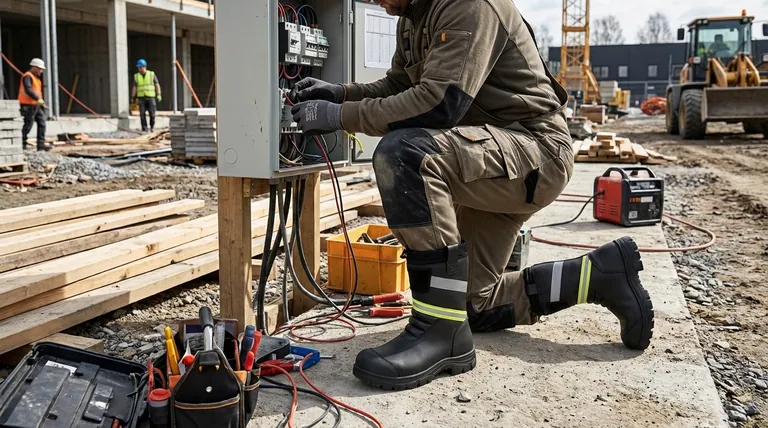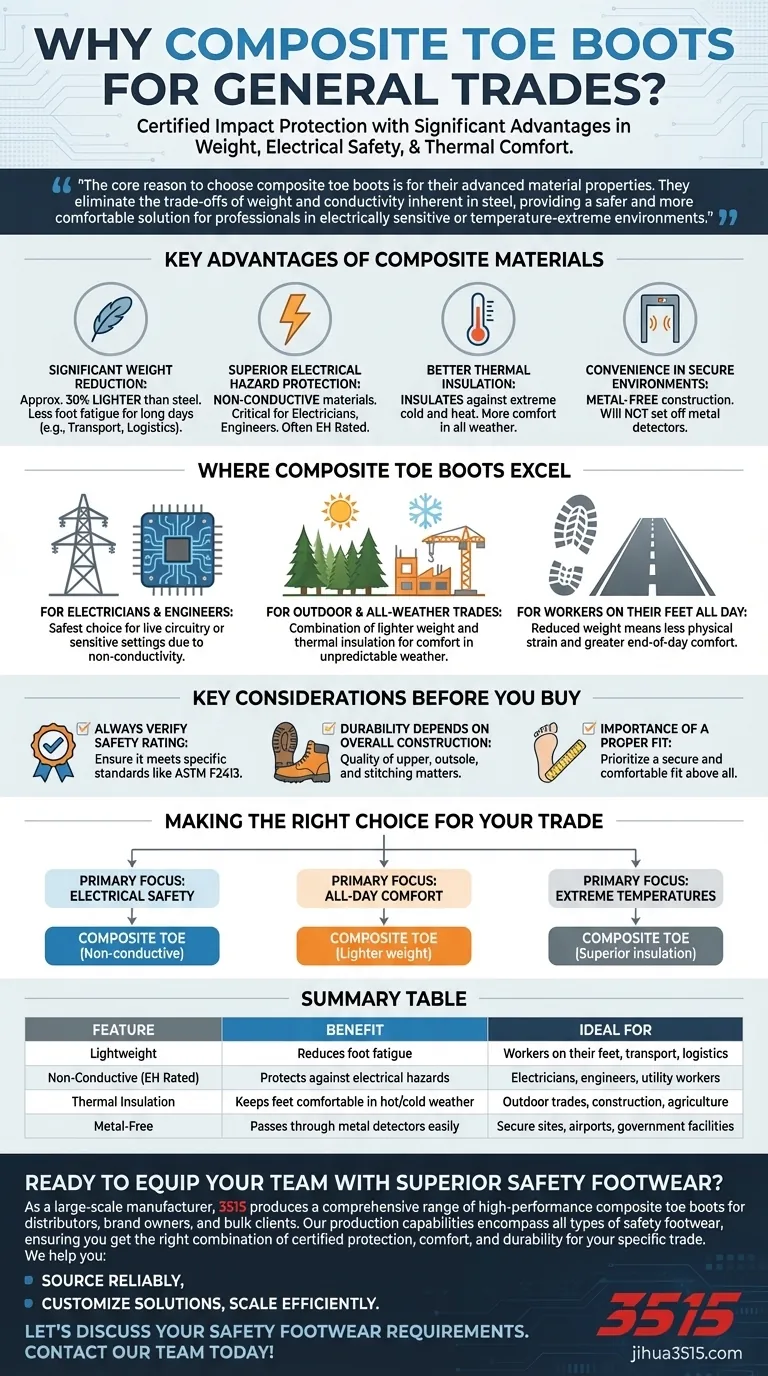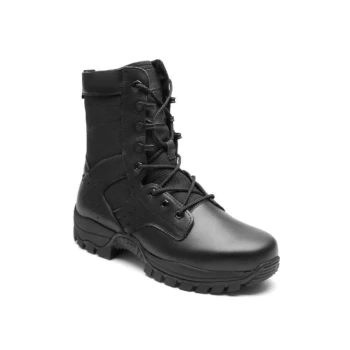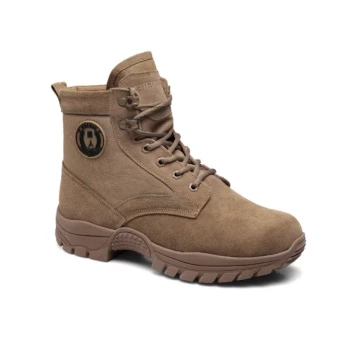Composite toe boots are an excellent choice for general trades because they deliver the same certified impact protection as steel toes but with significant advantages in weight, electrical safety, and thermal comfort. Made from non-metal materials like Kevlar, carbon fiber, or specialized plastics, they are engineered for modern worksites where these features are not just a convenience, but a critical safety requirement.
The core reason to choose composite toe boots is for their advanced material properties. They eliminate the trade-offs of weight and conductivity inherent in steel, providing a safer and more comfortable solution for professionals in electrically sensitive or temperature-extreme environments.

The Key Advantages of Composite Materials
The benefits of a composite toe cap go far beyond simple impact resistance. The choice of material directly influences the boot's performance, safety, and all-day comfort.
Significant Weight Reduction for All-Day Comfort
A composite toe cap is typically about 30 percent lighter than a steel toe cap. While this may seem minor, the reduction in weight dramatically lessens foot fatigue over a long and physically demanding workday.
This makes them ideal for workers in transport, logistics, or landscaping who spend hours on their feet.
Superior Electrical Hazard Protection
Because they are made from non-metal materials, composite toes do not conduct electricity. This is a critical safety feature for electricians, engineers, and anyone working in environments with potential electrical hazards.
Many of these boots carry an EH (Electrical Hazard) rating, signifying they meet specific standards for protection.
Better Thermal Insulation
Metal is a highly efficient conductor of temperature, meaning steel toe boots can become uncomfortably cold in the winter and hot in the summer.
Composite materials provide far better thermal insulation, helping to regulate the temperature inside the boot and keep your feet more comfortable in all weather conditions.
Convenience in Secure Environments
The metal-free construction means composite toe boots will not set off metal detectors. This is a significant practical benefit for workers who frequently need to pass through security checkpoints.
Where Composite Toe Boots Excel
While suitable for many trades, composite toe boots are the definitive choice for several specific applications where their unique properties provide a clear advantage.
For Electricians and Engineers
The non-conductive nature of composite materials makes these boots the safest and most logical choice for any professional working around live circuitry or in electronically sensitive settings.
For Outdoor and All-Weather Trades
Workers in forestry, agriculture, and construction benefit immensely from the combination of lighter weight and superior thermal insulation. These features provide greater comfort during long hours spent outdoors in unpredictable weather.
For Workers on Their Feet All Day
For any job that requires extensive walking or standing, the reduced weight of composite boots directly translates to less physical strain and greater end-of-day comfort.
Key Considerations Before You Buy
While composite toe boots offer many advantages, making an informed decision requires looking at the boot as a whole, not just the toe cap material.
Always Verify the Safety Rating
The most important feature of any safety boot is its official rating. Ensure the boot meets the specific safety requirements for your worksite, such as the ASTM F2413 standard for protective footwear in the United States. The material is secondary to the certified level of protection it provides.
Durability Depends on Overall Construction
The toe cap is only one component. The overall lifespan of a work boot depends on the quality of its other materials, including the leather or synthetic upper, the outsole compound, and the stitching quality.
The Importance of a Proper Fit
No safety feature can overcome the problems caused by an ill-fitting boot. Even the lightest, most advanced boot will cause discomfort and potential injury if it does not fit your foot correctly. Always prioritize a secure and comfortable fit.
Making the Right Choice for Your Trade
Ultimately, the best boot is the one that directly addresses the primary challenges and hazards of your specific job.
- If your primary focus is electrical safety: Composite toe boots are the definitive choice due to their non-conductive properties.
- If your primary focus is all-day comfort and reduced fatigue: The significant weight reduction of composite toes makes them ideal for jobs requiring extensive walking or standing.
- If your primary focus is working in extreme temperatures: The superior thermal insulation of composite materials will keep your feet more comfortable in both hot and cold conditions.
Choosing your boot based on the specific demands of your workday ensures you get the right protection without unnecessary compromise.
Summary Table:
| Feature | Benefit | Ideal For |
|---|---|---|
| Lightweight | Reduces foot fatigue for all-day comfort | Workers on their feet, transport, logistics |
| Non-Conductive (EH Rated) | Protects against electrical hazards | Electricians, engineers, utility workers |
| Thermal Insulation | Keeps feet comfortable in hot/cold weather | Outdoor trades, construction, agriculture |
| Metal-Free | Passes through metal detectors easily | Secure sites, airports, government facilities |
Ready to equip your team with superior safety footwear?
As a large-scale manufacturer, 3515 produces a comprehensive range of high-performance composite toe boots for distributors, brand owners, and bulk clients. Our production capabilities encompass all types of safety footwear, ensuring you get the right combination of certified protection, comfort, and durability for your specific trade.
We help you:
- Source Reliably: Ensure a steady supply of ASTM F2413 certified boots.
- Customize Solutions: Develop footwear tailored to your brand and your customers' unique needs.
- Scale Efficiently: Meet large-volume orders with consistent quality.
Let's discuss your safety footwear requirements. Contact our team today to request a catalog or get a quote!
Visual Guide

Related Products
- High Performance Fire-Retardant Waterproof Safety Boots
- Premium Wholesale Wheat Nubuck Safety Boot with Rapid Lacing System
- Premium High-Cut Waterproof Safety Boots Manufacturing & Wholesale Solutions
- Premium Grain Leather Safety Boots for Bulk Supply
- Factory-Direct Wholesale Canvas Boots with High-Traction Rubber Soles
People Also Ask
- What is the purpose of steel toe caps in firefighter boots? Maximum Impact & Crush Protection
- Why are professional safety shoes required during heavy-duty girder erection? Essential Protection for Infrastructure
- How do professional construction boots improve operational efficiency? Boost Site Productivity with Advanced Footwear
- What is the core protective function of steel-toe safety shoes in preventing lower limb injuries caused by chainsaws?
- What are the core advantages of using impact-resistant safety shoes in dairy farm mechanical work zones?



















